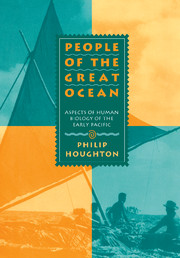7 - Legacy
Published online by Cambridge University Press: 27 January 2010
Summary
Following European contact, and exposure to diseases to which they had no natural immunity, the people of the Pacific suffered the devastation of epidemics that has been the melancholy fate of every newly encountered and previously isolated group. In the Americas the astonishing ease with which a few Spaniards came to dominate great indigenous civilizations is ascribable more to the allies of disease, such as smallpox, than to any military superiority. The near-extinction of the New England Indians has been related to initial epidemics of plague and smallpox and a subsequent high incidence of tuberculosis and dysentery (Cook 1973).
On small Pacific islands distance and isolation were for a while some protection, but the vulnerability was there and the record is clear and depressing (McArthur 1968). It is said that 25% of the population died when an epidemic of measles swept through Fiji in 1875. In Tonga a succession of introduced epidemic diseases seems to have reduced the population through the nineteenth century, but no clear major episode like that of measles in Fiji is recorded. Through the same period, influenza, dysentery and measles decimated the populations of Samoa, the Cook Islands and what is now termed French Polynesia. A smallpox epidemic spread through the Society Islands in the 1840s. And so on. Culpability for these episodes in human history is sometimes taken as one of those hair shirts that people of European origin should put on. Yet it was an inevitable biological consequence of a shrinking world, and for better or worse, no group was ever going to remain in pristine isolation.
- Type
- Chapter
- Information
- People of the Great OceanAspects of Human Biology of the Early Pacific, pp. 235 - 245Publisher: Cambridge University PressPrint publication year: 1996

